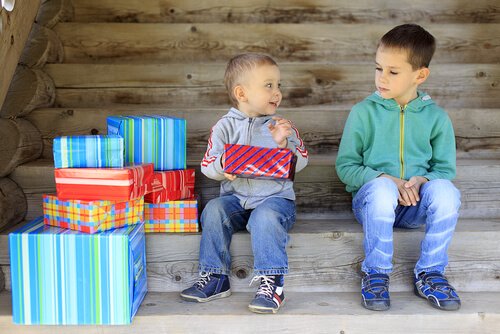Facts about Sibling Relationships

Without a doubt, siblings play a significant role in our lives and development. Throughout history, there have been many stories, legends, and tales about sibling relationships. As an example, we have Isis and Osiris’ love story and the sibling relationship in Mozart’s The Magic Flute.
Whether from first-hand experience or by observing other families, we’ve all seen how important sibling relationships really are. They even affect individuals’ cognitive development.
Parents put a lot of effort into training and educating their children. Although this is great, many parents believe those are the only means of education. However, they often don’t realize just how much siblings can teach and influence each other, either positively or negatively.
In this article, we’re going to talk about two specific hypotheses: (a) the sibling compensation hypothesis and (b) the hostility due to favoritism hypothesis. Both hypotheses are related to how parents treat their children.
“Siblings are the people we practice on, the people who teach us about fairness and cooperation and kindness and caring, quite often the hard way.”
-Pamela Dugdale-

The sibling compensation hypothesis
First and foremost, it’s important to clarify that sibling relationships can’t be studied or investigated on their own. What we mean by this is that it’s important to take other variables into account, such as how parents treat their children. What happens if parents don’t treat their children as they should? Could siblings compensate for this deficit through their relationship?
The sibling compensation hypothesis establishes that siblings can develop close, warm relationships. Consequently, they help each other in situations of poor parental care. In other words, the siblings compensate their lack of parental affection by caring for one another. That way, they’re able to develop normally despite the parental deficit.
Studies on this hypothesis have shown favorable results. It seems that there’s an inverse correlation between the quality of parent-child interaction and the quality of sibling relationships. Bryant and Crockenberg carried out a study where they found that a mother’s indifference towards her children correlated with a high number of prosocial behaviors from the oldest sibling to the youngest.
These results make us think that, in the absence of parental support, siblings resort to supporting and teaching one another. However, it’s important to be careful when interpreting this data, since other studies have yielded different results. Like we said above, it isn’t easy to study sibling relationships because no two cases are alike. Many different factors besides parental treatment play a role.

Hostility due to favoritism hypothesis
Parental behavior can also lead to hostility among siblings. That’s where this hypothesis comes into play. It refers to the children’s perceptions of the way parents treat them.
The hostility due to favoritism hypothesis suggests that sibling relationships can turn hostile if one of them perceives that their parents treat them differently than their other sibling(s). In other words, if a child perceives that their parents show favoritism toward another sibling (or siblings, for that matter), they’ll automatically feel jealous and envious. As a result, the child will show hostile behavior toward their sibling(s).
Hetherington carried out an experiment concluded that when parents are less affectionate toward one child, the likelihood of sibling relationships turning aggressive increases. The child rebels against their parents by seeking revenge against their siblings. However, there are many more factors that can influence sibling relationships.
All studies related to this topic show just how important sibling relationships are to a person’s development. In the end, siblings are the people we can always turn to in life.
“They say that no matter how old you become, when you are with your siblings, you revert back to childhood.”
-Karen White-
All cited sources were thoroughly reviewed by our team to ensure their quality, reliability, currency, and validity. The bibliography of this article was considered reliable and of academic or scientific accuracy.
Bryant, B. K., & Crockenberg, S. B. (1980). Correlates and dimensions of prosocial behavior: a study of female siblings with their mothers. Child Development. https://doi.org/10.1111/j.1467-8624.1980.tb02575.x
This text is provided for informational purposes only and does not replace consultation with a professional. If in doubt, consult your specialist.








